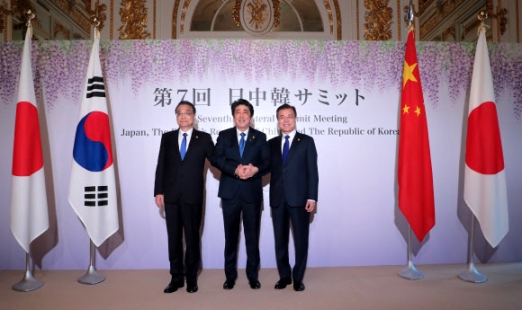 |
|
South Korean President Moon Jae-in (center of the right side) and Chinese Premier Li Keqiang (on left side) and Japanese Prime Minister Shinzo Abe met for the 7th trilateral summit between South Korea, China and Japan on May 9 in Tokyo. (Yonhap News)
|
Support of China and Japan give green light for North Korea-US summit and peace regime in Northeast Asia
South Korean President Moon Jae-in, Chinese Premier Li Keqiang, and Japanese Prime Minister Shinzo Abe adopted a special statement and welcomed the South and North Korean leaders’ recent Panmunjeom Declaration in a trilateral summit on May 9 in Tokyo. In the statement, the three leaders voiced their hopes for a successful North Korea-US summit and pledged to continue working to ensure the inter-Korean summit’s success contributes to peace and stability in Northeast Asia. The success in enlisting the cooperation and support of South Korea’s neighbors China and Japan is especially meaningful ahead of a North Korea-US summit that is poised to be a watershed in denuclearization and establishment of a peace regime. Beijing has been in a battle of nerves with Washington, voicing concerns that it was being “left out” of the declaration of the Korean War’s end and signing of a peace agreement. Tokyo has been tenacious about bringing up issues including the abduction of Japanese citizens by North Korea. Quite a few observers predicted their attitudes could prove stumbling blocks to the establishment of peace on the peninsula. The special statement by the three leaders is especially welcome for dispelling these fears. Both China and Japan expressed support for the Panmunjeom Declaration, and the green light was given for both the North Korea-US summit and establishment of a Northeast Asia peace regime. President Moon and Premier Li’s agreement in a separate summit to cooperate closely on declaring the Korean War over and signing a peace agreement was an especially positive step. Also noteworthy were the agreements to hold such summits regularly and to step up practical collaborative efforts that will have a real impact on the lives of residents in the three countries, including cooperation on resolving fine particle dust and other air pollution issues. Hopefully, implementation of these terms will lead to their not only becoming more “neighborly,” but also to a positive feedback loop in terms of Northeast Asian peace and prosperity. It’s also a welcome development that President Moon – the first South Korean President to visit Japan in six years and five months – declared a restoration of shuttle diplomacy in his bilateral summit with Abe and reached an agreement to increase economic, cultural, and personal exchange. Hopefully, this will lead to a recovery after the strain inflicted on Seoul and Tokyo’s ties by Japan’s misguided historical views and the intergovernmental comfort women agreement hastily signed in Dec. 2015. Please direct comments or questions to [english@hani.co.kr]






